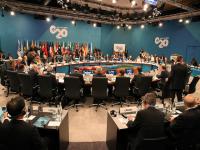 The agreement reached at the recent G20 Leaders’ Summit in Australia will boost Indonesia’s international trade, enhance the national economy, and improve living standards, according to Indonesia’s Ministry of Trade.
The agreement reached at the recent G20 Leaders’ Summit in Australia will boost Indonesia’s international trade, enhance the national economy, and improve living standards, according to Indonesia’s Ministry of Trade.
The annual meeting, held on November 15-16, 2014 in Brisbane, Australia, and attended by heads of states and governments from 20 of the largest countries in the world, including newly elected Indonesian President Joko Widodo, concluded with the Leaders’ Communiqué and the Brisbane Action Plan, which underlines measures dealing with investment, finance, trade, and business competition.
Through the communiqué and the action plan, the leaders agreed to work together and individually in their own countries in the areas of investment, finance, and trade to accelerate economic growth, create jobs, and improve people’s living standards.
The agreement encompasses investment in infrastructure development under the Global Infrastructure Initiative that calls for collecting additional funding to reach US$1 trillion each year to meet the infrastructure development needs of the business world. The G20 also pledged support for the World Bank’s Global Infrastructure Facility program that combines the strengths of the banking, private, and government sectors to speed up implementation of infrastructure investment projects in developing countries.
“The Brisbane Action Plan 2014 encompasses measures to promote business competition and trade that accelerates development and people’s living standards, increases production capacity of goods and services, and streamlines the supply chain to lower cost of transactions and distribution. Regulatory barriers and customs procedures will be reduced, and protectionism will be controlled,” said Bachrul Chairi, director general of international trade cooperation of Indonesia’s Ministry of Trade, who spoke at the summit.
On organizational strengthening, the G20 leaders made a commitment to support the resilience of the international monetary system and WTO reforms “to be more in line with the needs of the times.”
“The G20 urges the WTO to quickly realize all the agreements that were reached at the 9th Ministerial Conference (MC9) in Bali in 2013, including the Trade Facilitation Agreement and aid for trade,” said the director general.
The 2014 Brisbane Action Plan contains measures to be taken by G20 members collectively and individually to expedite economic growth. The target is to increase GDP growth by 2% above the projected GDP growth until 2018 as previously predicted by the International Monetary Fund.
In trade, the G20 plan of action includes implementing the WTO’s Trade Facilitation Agreement, a domestic revamping (structural reform) to streamline business and distribution of goods, and also control of trade barriers between countries.
Indonesian exports to the G20 member-countries in 2013 was 70%, amounting to about $127.5 billion, of the national export total, said Bachrul. Indonesia enjoyed a surplus of about $8.6 billion.
The G20 represents 85% of the world’s income, 79% of world trade, and 65% of the world population. Its members are Argentina, Australia, Brazil, Canada, China, France, Germany, India, Indonesia, Italy, Japan, Republic of Korea, Mexico, Russia, Saudi Arabia, South Africa, Turkey, the United Kingdom, the United States, and the European Union.




